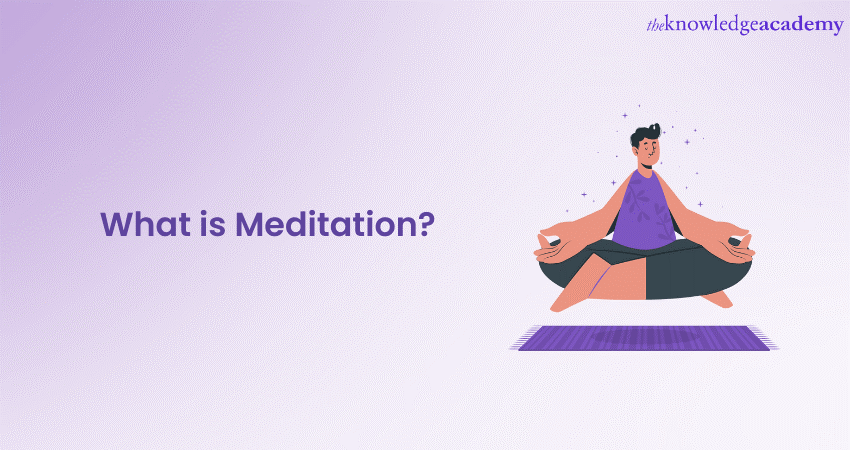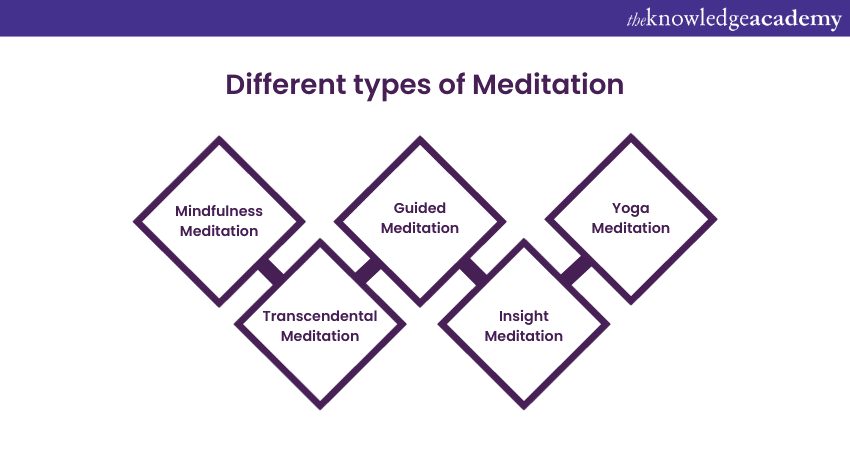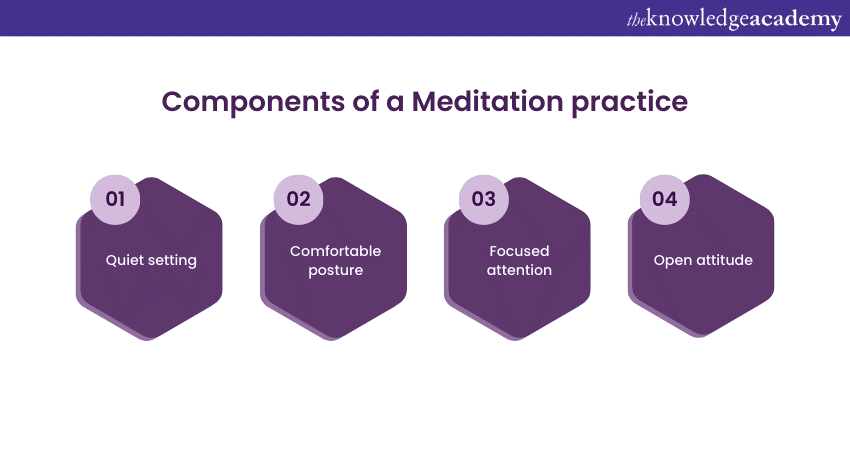We may not have the course you’re looking for. If you enquire or give us a call on 01344203999 and speak to our training experts, we may still be able to help with your training requirements.
Training Outcomes Within Your Budget!
We ensure quality, budget-alignment, and timely delivery by our expert instructors.

Practising mental and physical well-being is essential. This practice of achieving wellbeing has become more prominent as we face physical and mental ailments. This can be achieved through Meditation, but do you know What is Meditation?
Meditation is a profound and ancient practice, deeply rooted in various cultural and spiritual traditions, yet widely embraced in contemporary life for its mental and physical health benefits. It involves training the mind to induce a mode of consciousness that promotes relaxation, builds internal energy, and develops compassion, love, patience, generosity, and forgiveness.
So, let’s discuss What is Mediation and how practicing it improves your physical and mental wellbeing. You will also learn its various advantages and some tips to improve it.
Table of Contents
1) What is Meditation?
2) Different types of Meditation
3) How to practice Meditation?
4) What does Meditation do?
5) Advantages of Meditation
6) Components of a Meditation practice
7) Practical tips for Meditating
8) Conclusion
What is Meditation?
Meditation is a personal practice that involves techniques to focus and redirect thoughts and increase awareness of oneself and one's surroundings. This ancient tradition, with roots in various religious and spiritual contexts, has evolved into a secular tool for enhancing mental and physical well-being. Fundamentally, it involves training the mind to induce a state of consciousness where the practitioner achieves emotional calmness, mental clarity, and an enhanced state of mindfulness or concentration.
The practice can take various forms but commonly includes focusing on a particular object, thought, or activity – such as breathing, a sound (like a mantra), or visualisation – to cultivate inner peace and relaxation. It's about training in awareness and getting a good sense of perspective. Meditation is about learning to train your mind from disturbed to peaceful. This transformative potential makes Meditation a powerful practice in personal development and Mental Health management.
Different types of Meditation
Meditation manifests in various forms, each with unique characteristics and benefits. It also caters to different preferences and goals:

a) Mindfulness Meditation: Originating from Buddhist teachings, this is one of the most popular types of Meditation. It involves paying attention to your thoughts as they pass through your mind. The goal is not to become involved with the ideas or judge them, but to be aware of each mental note as it arises.
b) Transcendental Meditation: This form of Meditation involves silently repeating a mantra – a word, sound, or phrase. This is done to quiet the mind and achieve a state of deep relaxation and peace. Unlike mindfulness, it requires specific training and the guidance of a certified teacher.
c) Guided Meditation: This type is also known as guided imagery or visualisation. This method involves forming mental images of places or situations you find relaxing. A guide or teacher often leads it and may incorporate narrative storytelling and music.
d) Vipassana Meditation (Insight Meditation): One of India's most ancient Meditation techniques, it focuses on deep self-observation, paying close attention to the physical sensations in the body, to understand the nature of reality.
e) Loving-kindness Meditation (Metta Meditation): This practice involves directing well-wishes towards others. It begins with developing kind thoughts and feelings toward oneself, then expanding this love outward to friends, family, acquaintances, and eventually all living beings.
f) Yoga Meditation: Many yoga practices incorporate Meditation, using physical postures and controlled breathing exercises to achieve a focused, meditative state. Yoga Meditation is diverse, with styles like Kundalini, Hatha, and Ashtanga offering different pathways to mindfulness and relaxation.
Do you want to learn how to practice an active and healthy lifestyle? Register now for our Healthy Lifestyles Training!
How to practice Meditation?
Practising Meditation involves several key steps and considerations to create a conducive environment for effective Meditation:
a) Find a quiet space: Reduce distractions by choosing a calm and quiet place for your practice. This could be a dedicated room, a quiet corner, or a peaceful outdoor spot.
b) Choose a comfortable position: Before practising Meditation, you must choose a comfortable position. You can sit in a traditional meditative pose or any comfortable position. Ensure that you maintain good posture, which helps with breathing and concentration.
c) Focus your mind: Choose a point of focus. This could be your breath, a mantra, a specific object, or even the sensations in your body. The goal is to centre your attention and gently bring it back whenever your mind wanders.
d) Breathe slowly and deeply: Controlled breathing is a vital part of Meditation. Deep and slow breaths help calm the mind and facilitate focus.
e) Start with short sessions: Initially, Meditate for short periods, like 5-10 minutes. As you get more comfortable, gradually increase the duration. Consistency is more important than length.
f) Close with reflection: After each session, spend a few minutes reflecting on your experience, the sensations, and any thoughts or emotions that arose.
Learn how to Meditate from our experts – sign up now for our Meditation Masterclass!
What does Meditation do?
Meditation profoundly affects the mind and body, significantly impacting cognitive and physiological processes. This is what Meditation does to the mind and body:
a) Mental clarity and focus: Meditation helps clear the accumulated information overload contributing to stress. The practice trains the brain to focus and redirect thoughts, which enhances attention and concentration.
b) Emotional balance: Regular Meditation helps develop a deeper understanding of yourself, leading to a more positive life perspective. It fosters emotional resilience, making it easier to handle adverse situations.
c) Stress reduction: One of its most significant benefits is its ability to reduce stress. By inducing a state of relaxation, Meditation helps reduce the elevated stress hormone levels, known as cortisol.
d) Neurological benefits: Research indicates that Meditation can change brain regions involved in memory, self-awareness, and empathy. It may also improve the brain's ability to process information.
e) Physical health: Meditation can contribute to physical well-being. It can also reduce anxiety, lower blood pressure, improve sleep patterns, and even alleviate symptoms of certain chronic illnesses.
Learn all the basic principles of Cognitive Behavioural Therapy with our Develop Cognitive Behavioural Therapy Training!
Advantages of Meditation
The benefits of Meditation are wide-ranging and can significantly improve quality of life. Let’s see how:
a) Reduced stress: Meditation is particularly effective in reducing stress, a common cause of numerous health problems.
b) Enhanced emotional well-being: Regular practitioners often report improved mood, increased self-esteem, and greater optimism.
c) Improved concentration: It enhances the brain's ability to focus and sustain attention, increasing productivity.
d) Better sleep: It helps manage thoughts that can lead to insomnia and improves relaxation, making it easier to fall asleep.
e) Physical health: Regular Meditation can help lower blood pressure, reduce chronic pain, and boost the immune system.
f) Mindfulness in daily life: It encourages heightened awareness and focus, improving quality of life.
Components of a Meditation practice
Effective Meditation practice is built upon several key components. These are as follows:

a) Quiet setting: Meditation requires a peaceful environment to minimise external distractions. This could be anywhere you can sit or lie comfortably without interruptions.
b) Comfortable posture: Your posture can be on a chair, cushion, or floor as long as it’s comfortable. It’s essential to maintain the natural curve of your back.
c) Focused attention: Focusing on a single point is crucial in Meditation. This point could be a sound, object, visualisation, breath, movement, or a mantra.
d) Open attitude: You need to let distractions come and go naturally without attaching to or judging them, which is essential. This relaxed attitude allows a return to the focus of Meditation.
Practical tips for Meditating
To enhance your Meditation practice, consider the following tips:
a) Consistency: Set aside time each day for Meditation, even just a few minutes. Consistency is critical to developing a sustainable practice.
b) Start small: If you’re new to Meditation, start with short sessions of about 5-10 minutes and gradually increase the time.
c) Use guided Meditations: If you find difficulty in meditating alone, use guided Meditations. Many apps and online resources offer guided sessions for beginners.
d) Mindfulness in daily activities: Try incorporating mindfulness into everyday activities like eating, walking, or listening. This can enhance your Meditation practice.
e) Patience and non-judgment: Be patient with your progress and avoid judging your Meditation skills. Like any skill, Meditation takes time to develop.
Do you want to learn Yoga? Join our Yoga Masterclass today!
Conclusion
We hope that you understood What is Meditation from this blog. Meditation is a valuable and versatile tool for enhancing mental, emotional, and physical health. Its various forms and techniques offer something for everyone, regardless of age or background.
Learn a detailed knowledge about Nutrition to help you lead a healthier lifestyle – register now for our Nutrition Course!







 Top Rated Course
Top Rated Course




 If you wish to make any changes to your course, please
If you wish to make any changes to your course, please


